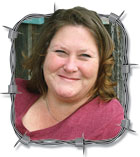
Franklin D. Roosevelt once said, “We cannot always build the future for our youth, but we can build the youth for the future.”
Eighty years later, that statement – made by the 32nd U.S. president in his 1940 address to the University of Pennsylvania – continues to ring true. We don’t know what the future holds, but we can help shape those who will live it.
Farm kids, in my opinion, are built for the future. They learn responsibility and accountability early in life, and they also understand what it means to work for something. Those are attributes for success as an adult.
Some of their peers are not faced with the same “to-do-list” farm kids have. For a town kid, mowing the yard may be the big chore of the day, and they may have to feed the dog or cat. Meanwhile, his/her friend, the farm kid, has acres of hay to cut and livestock to feed and care for. Then, if there is still daylight, they may have to mow the yard. I want to clarify that not all “town teens” live on Easy Street. Many non-farm kids have responsibilities and jobs that require them to be mentally and physically on the ball. They, like farm kids, are learning life lessons, just in a different way.
We are seeing a new wave in agriculture today of young people who have no farming backgrounds looking at agriculture as a career choice. They are fascinated by the science of agriculture and are becoming great advocates of the industry. They are working to show other young people how agriculture impacts them each day. Those hope-to-be farmers and agriculturalists are taking the initiative to venture down a path untraveled by their friends and family.
How can we help build young people who will be at the helm of the industry? It can be as simple as giving a little time. Be a mentor to a young person who is interested in agriculture.
Take time to teach your children or grandchildren about life on the farm. You don’t have to paint a pretty picture of lush green fields and fat cows, either. Life on the farm isn’t always easy, and if young people aren’t prepared for the “downs” on the farm, they won’t know how to deal with those times, nor will they appreciate the ups. Teach them money doesn’t grow on trees, and there’s a difference between needs and wants.
Show support by becoming a supporter of your local youth programs. I’m a member of my local FFA alumni group, sit on my county Extension council, and I try to help out my local fair board when I can. Some ask why I do these things when I have no children involved, but I have lots of kids. They might not be “my kids,” but I’m Aunt Julie to 10 who are, have been, or who will be involved in those groups. I’m also Bonus Nanna to an FFA member, his little brother, and his little brother or sister who will arrive this spring, so I’ve got several years ahead yet for my kids.
In this issue of OFN, we’re honoring a few of the youth dedicated to the ag industry in the Ozarks. We even have some ag royalty. These kids are great examples of young people who are building their own future. Thankfully, they have a lot of support from others around them.
As you peruse the pages, think about how you can help shape the future of agricultural practitioners. After all, they’re our future as well.
Julie Turner-Crawford is a native of Dallas County, Mo., where she grew up on her family’s farm. She is a graduate of Missouri State University. To contact Julie, call 1-866-532-1960 or by email at [email protected].





